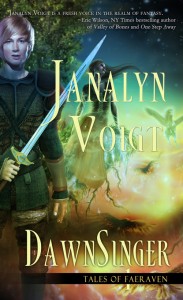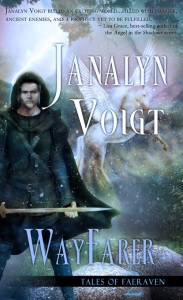 7 MEDIEVAL WORDS TO SAVOR
7 MEDIEVAL WORDS TO SAVOR
Guest Post by Northwest Author Janalyn Voigt
SAVORING UNFAMILIAR WORDS
A precocious reader at a young age, I collected words the way some children collect stickers. I can remember reading adult novels at the age of nine and pausing here and there to savor an unfamiliar word. Never mind consulting a dictionary. I could usually figure out what it meant in context. As for the pronunciation, well… later in life I would discover my guesses didn’t always reflect the actual pronunciation.
FORGOTTEN GEMS
One of my personal complaints is that certain worthy words, for one reason or another, have gone out of style. I found writing my Tales of Faeraven trilogy cathartic in that I was able to use some of these forgotten gems, and I thought you might enjoy savoring some of them with me.
MEDIEVAL WORD USED IN DAWNSINGER
- Fell: This word comes unaltered from Old English. It means inhumanly fierce, strange, and other-worldly. The word felon comes to us from an Old French variant of this word. The expression, one fell swoop uses this word in context. My editors stripped this word out of book two of my trilogy, but they let me use it in book one.
Usage in DawnSinger: “A fell spirit somehow touched mine.”
MEDIEVAL WORDS USED IN WAYFARER
- Bard: The origins of this word mean packsaddle, and that seems appropriate since it refers to a traveling lyric poet and musician.
Usage in Wayfarer: Jugglers, bards, and acrobats waited to regale them.
- Ken: This luscious word, which means to know or understand, derived in Scotland from the Middle English kennan, which in turn was based on the old Norse word, kenna, which means to perceive.
Usage in Wayfarer: “What troubles you? Although I ken well enough, I think.”
- Bastion: Derived from the Old French bastille, which means fortress, it may have originated from the idea of making something with bast, the inner bark of the linden tree, which was used for building. A bastion was a projection in a fortification that allowed defense of a wall.
Usage in Wayfarer: “He’s uninjured, but we lost several archers on the wall and three who manned a bastion.”
- Embrasure: This word is of uncertain origin but derives from the obsolete French embraser, which means to widen. It defines an opening in a wall, especially one with splayed sides that widen inwardly.
Usage in Wayfarer: Elcon clutched the rough stone at the edges of the embrasure.
- Fealty: From the Old French feauté, this word originated with a Latin word for fidelity. It stood for loyalty and faithfulness. In the Middle Ages as a practice of chivalry, knights often took oaths of fealty to their liege lords.
Usage in Wayfarer: Kai bowed at his feet and pledged fealty.
- Barbican: The Old French barbacane may have evolved from a Arabic or Persian word for gatehouse to create this word for an outer gatehouse that protected a city or castle.
Usage in Wayfarer: “Who goes there?” A guard called from the parapet above the barbican.
The study of words is truly fascinating. I hope you’ve enjoyed my list.
SPECIAL OFFER FOR JANUARY 3, 2014 ONLY!
In celebration of the release of Wayfarer, book two in Janalyn Voigt’s Tales of Faeraven trilogy, her publisher is offering her book at a 50% discount.
Click here to take advantage of this offer.
MORE ABOUT JANALYN VOIGT
As children, my older brother and I would beg my father for bedtime stories, and he would give them. His deep voice rumbled against my ear at his chest as he unfolded stories of exotic places like Oz and Neverland. My imagination carried on with the tales even after he closed the book for the night. When eventually he stopped reading stories, I began creating my own.
Within a few years I’d become storyteller of my neighborhood. The other children would gather in a circle on our lawn while I invented stories to entertain them. No one, including myself, thought of this as anything unusual. It wasn’t until my sixth-grade teacher pointed out my ability to spin a tale that I and my parents took note. This is how at the age of twelve I decided to become a novelist. At it turns out, the fulfillment of that dream took a few more years than planned.
Find out more about Janalyn, her closet writing office,
and her books at the author website for Janalyn Voigt
To read Sarah Gunning Moser’s prior review of DawnSinger:
http://www.familyedservices.com/blog/fantasy-world-dawnsinger/


[…] Sarah Gunning Moser (Family Education Services) Medieval Words to Savor […]
Excellent, Janalyn. I love old words, too. Shall we help bring them back into use?
I enjoyed writing this post for you, Sarah. Thanks for helping me put the word out about Wayfarer’s release.
Janalyn
Good thought, Sylvia. 🙂
Sylvia:
I’m with you both a hundred percent. Most people have little or no appreciation of the English language and too few understand its magnificent history, as well as God’s usage of it around the world.
With over 2 billion English-speaking people on the planet now, a number which increases annually, by 2050 – if the Lord tarries – there will be approximately 4-5 BILLION people who speak English at least as a tertiary language. America needs to wake up and get back to teaching/studying it properly.
It’s one reason I love Janalyn’s writing so much: she isn’t afraid to utilize older words. Problem is, if people don’t pay attention to that they can’t understand great literature, either. The breadth of the language includes “obsolete” words, but they’re still part of our history and lexicon. Those who still read Shakespeare, et al, will still encounter such words, as will historians.
OK, off the soapbox now. For awhile!
Sarah
[…] Sarah Gunning Moser (Family Education Services) Medieval Words to Savor […]
Enjoyed reading this lexicon of words on the world of Janayln’s new Wayfarer novel. Look forward to reading DawnSinger too!
Blessings,
Janet Chester Bly
Bly Books
Janet: You won’t be sorry. Janalyn is a wonderful writer and the story of her trilogy is well worth reading. It’s rare these days to encounter such lyrical writing that is richly descriptive and doesn’t pander to a sixth grade reading level. You’ll find yourself drawn deeply into the world of Faeraven!
excellent points altogether, you just gained a new reader. What would you recommend about your post that you made a few days ago? Any positive?
Hi!
Thanks for posting on my blog. I’m afraid I don’t know your first name or would have replied with it, but I am delighted to hear from you. Sorry it took so long to write; I just picked this up today, September 13, 2016. I have been busy teaching SWR seminars and on vacation.
I am glad your are interested in continuing to read my blog. I am revamping some things right now but keep checking for new information and articles, including book reviews from time to time.
If you wish to subscribe and receive all posts from me, you may do so in the “Subscribe to My Blog” section in the top right of each blog page.
In terms of your request for recommendations, do you mean more book or author recommendations, or are you interested in learning more about English tutoring, the Spell to Write and Read program, modern versus classic dictionaries, etc.?
Let me know your other interests and I will respond.
Blessings,
Sarah Moser
GUEST POST: 7 MEDIEVAL WORDS « | Family Education Services http://informatycy.info